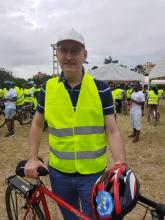Together we can #BeatAirPollution
World Environment Day 2019 was commemorated this year on 5th June under the theme “Air Pollution". Why? It’s simple. Air pollution is one of the most important environmental health risks. Nine in ten people worldwide breathe air that is not safe and, globally, around 7 million people die prematurely each year, with the highest burden in Asia and Africa. Globally, 4.2 million deaths every year occur as a result of exposure to ambient (outdoor) air pollution and 3.8 million deaths as a result of household exposure to smoke from dirty cookstoves and fuels. 91% of the world’s population lives in places where air quality exceeds WHO guideline limits.
The evidence is clear: air pollution has a devastating impact on children’s health. Acute Lower Respiratory Infections (ALRI) is one of the leading killers of children worldwide. 1 in every 2 deaths of children under the age of 5 is from ALRI caused by air pollution. And we know healthy adulthood begins with a healthy childhood.
That is why for World Environment Day 2019 WHO urges governments, industry, communities, and individuals to come together to explore renewable energy and green technologies, and improve air quality in cities and regions across the world, which would contribute to saving up to US$5 trillion every year, the actual welfare cost of air pollution for the global economy.
In Tanzania, the commemorations took place on 8th June in Dar es Salaam stressing the need for governments, industry, communities, and individuals to come together to explore renewable energy and green technologies, and improve air quality in cities and regions across the world.
Speaking during the event, the Deputy Secretary of Vice President’s Office (Union and Environmental Affairs) Ambassador Joseph Sokoine recognized the valuable contribution that various partners and the United Nations were making in protection the environment. The Deputy Secretary urged all partners and stakeholders to continue working with the government to support and advocate for reducing air pollution and use of plastic carrier bags.
On the ban of plastic carrier bags the Deputy Secretary said that “The government is impressed with the level of compliance from public and private sector and collaboration, making Tanzania among 60 countries globally who has ban use of plastic bags”. He continued by saying that plastic carrier bags are strong, cheap, moisturize resistance, given free to consumer, all these encourage its usage. As a result, 10% of municipal waste comprises of plastic carrier bags, which takes 400- 1000 years to decompose.On economic gain, the Deputy Secretary said that 80% of carrier bags consumed were imported and only 20% were locally manufactured. The value chain involve few people, the ban will stimulate production of local alternative bags using machinery or manual, which will involve large group of people to produce alternatives bags hence the ban is a blessing to many . Deputy Secretary ended up thanking the Cycling Association for being part of the solution by reducing air pollution and encourage exercise and eating healthy.
At the same event, the UN Resident Coordinator, Mr Alvaro Rodriguez delivered a speech on behalf of the United Nations. He stated that the UN in Tanzania was committed to supporting environmental protection efforts. Mr Alvaro Rodriguez acknowledged the efforts done by the government and appealed to academic and private sector to do more by investing in innovations to come up with high new technologies to reduce environment pollution. In his statement he stated that there other initiatives the country can do to protect the environment such as investing in side walking, cyclists lane and rapid transport. Mr Alvaro Rodriguez further said that waste management could be improved and air quality management monitoring system developed. UN would continue to make investments in environment protection and reaffirmed its commitment to working with the Government of the Republic of Tanzania and other collaborates against environmental and air pollution.
WHO contributed to the media seminar and cycling event organized in commemoration of the day by the UN in partnership with the Vice President's Office, Cycling Association of Tanzania, WWF, World Bank, German Embassy, GIZ, and many others. WHO has demonstrated its commitment to this public health issue by publishing a series of air quality guidelines setting air quality standards to safeguard health. In addition to producing the guidelines, WHO works with many sectors: transport, energy, academia, urban planning, rural development, local governments to improve air quality and protecting the health of their populations. WHO also reviews scientific evidence on the health effects of air pollution; provides publications and tools for quantifying the health risks of air pollution; providing evidence-based guidance to policy-makers and public health advice to governments.
What can you do to fight air pollution?
- Use public transport, cycle or walk
- Don’t drive during rush hour
- Compost or recycle waste instead of burning
- Do not use plastic bags
- Use renewable energy to power homes
- Save energy by turning off lights and electronics when not in use
- Use clean energy to cook



